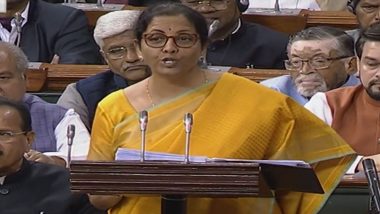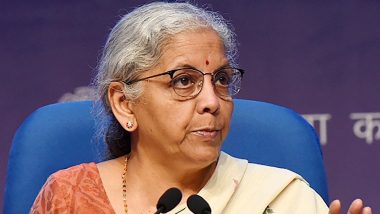New Delhi, February 2: Finance Minister Nirmala Sitharaman on Saturday announced the Union budget for the year 2020-21. Though the budget reading had to be cut short due to FM's ill-health, it was still the longest ever budget read by a finance minister in terms of duration (2 hours, 43 minutes). From announcing new Income Tax rates to big announcements in the fields of health, education, infrastructure, and other areas, the budget was typical in the sense it had its own share of hits and misses. Budget 2020: Full Text of Nirmala Sitharaman's Speech in Hindi And English, Download PDF Here.
Sitharaman said Budget 2020 was directed at boosting incomes and enhancing the purchasing power of the consumers. Several experts echoed that sentiment calling it a consumer-driven budget rather than a producer oriented one. Union Budget 2020-21 Updates: Nirmala Sitharaman Relieves Salaried Class With Income Tax Rate Cuts, Announces LIC Stake Sale; Check Full Highlights.
Here's Key Highlight of Announcement from Various Sectors:
Agriculture And Farming:
1) Rs 2.83 lakh crore allocation for the 16 action points:
a) Rs 1.60 lakh crore for Agriculture, Irrigation & allied activities.
b) Rs 1.23 lakh crore for Rural development & Panchayati Raj.
2) Agriculture Credit: Rs 15 lakh crore target set for the year 2020-21 and NABARD re-finance Scheme to be further expanded.
4) Pisciculture and Blue Economy:
a) Rs 1 lakh crore fisheries’ exports target to be achieved by 2024-25.
b) 200 lakh tonnes fish production targeted by 2022-23.
c) 3477 Sagar Mitras and 500 Fish Farmer Producer Organisations to involve youth in fisheries extension.
5) Kisan Rail to be setup by Indian Railways through PPP.
6) Krishi Udaan to be launched by the Ministry of Civil Aviation.
7) Expansion of PM-Kusum to be extended 20 lakh farmers, and 15 lakh farmers to be helped to solarise their grid-connected pump sets.
8) Warehousing in line with Warehouse Development and Regulatory Authority (WDRA) for setting up such efficient warehouses at the block/taluk level.
9) Livestock: Doubling of milk processing capacity to 108 million MT from 53.5 million MT by 2025.
Healthcare:
1) Rs. 69,000 crore allocated for overall Healthcare sector.
2) Rs 6400 crore (out of Rs. 69,000 crore) for PM Jan Arogya Yojana (PMJAY).
3) TB Harega Desh Jeetega campaign launched - commitment to end Tuberculosis by 2025.
4) Rs 3.60 lakh crore allocated for Jal Jeevan Mission.
5) Rs 12, 300 crore allocation for Swachh Bharat Mission in 2020-21.
Education:
1) Rs 99,300 crore for education sector and Rs 3000 crore for skill development in 2020-21.
b) New Education Policy to be announced soon.
Income Tax:
New Income Tax Rates And Slabs For 2020-21:
| Income Per Annum | Existing Tax Rate | New Tax Rate |
| Rs 0-2.5 Lakhs | 0% | 0% |
| Rs 2.5-5 Lakhs | 5% | 5% |
| Rs 5-7.5 Lakhs | 20% | 10% |
| Rs 7.5-10 Lakhs | 20% | 15% |
| Rs 10-12.5 Lakhs | 30% | 20% |
| Rs 12.5-15 Lakhs | 30% | 25% |
| Above Rs 15 Lakh | 30% | 30% |
Here's the Current Income Tax Rates And Slabs:
| Income Slabs (Individual below 60 years of age) | Tax Rates | Income Slabs (resident & above 60 years but below 80 years) | Tax Rates | Income Slabs (resident & above 80 years) | Tax Rates |
| Total income up to Rs. 2.5 Lac | NIL | Total income up to Rs. 3.00 Lac | NIL | NA | NA |
| Total income exceeds Rs. 2.5 Lac but less than Rs.5 Lac | 5% on amount exceeding Rs. 2.5 Lac | Total income exceeds Rs. 3 Lac but less than Rs.5 Lac | 10% on amount exceeding Rs. 3.00 Lac | Total income up to Rs. 5 Lac | NIL |
| Total income exceeds Rs. 5 Lac but less than Rs.10 Lac | 20% on Income exceeding Rs. 5 Lac + Rs. 25,000 | Total income exceeds Rs. 5 Lac but less than Rs.10 Lac | 20% on Income exceeding Rs. 5 Lac + Rs. 20,000 | Total income exceeds Rs. 5 Lac but less than Rs.10 Lac | 20% on Income exceeding Rs. 5 Lac |
| Total income more than Rs. 10 Lac | 30% on Income exceeding Rs. 10 Lac + Rs. 1,25,000 | Total income more than Rs. 10 Lac | 30% on Income exceeding Rs. 10 Lac + Rs. 1,20,000 | Total income more than Rs. 10 Lac | 30% on Income exceeding Rs. 10 Lac + Rs. 1 Lac |
Direct & Indirect Taxes:
a) Tax rate of 15% extended to new electricity generation companies.
b) Dividend Distribution Tax (DDT) removed making India a more attractive investment destination.
c) Start-ups with turnover up to Rs. 100 crore to enjoy 100% deduction for 3 consecutive assessment years out of 10 years.
d) Additional deduction up to Rs. 1.5 lakhs for interest paid on loans taken for an affordable house extended till 31st March, 2021.
e) Faceless appeals to be enabled by amending the Income Tax Act.
f) Customs duty raised on footwear to 35% from 25% and on furniture goods to 25% from 20%.
g) Basic customs duty on imports of news print and light-weight coated paper reduced from 10% to 5%.
h) Customs duty rates revised on electric vehicles and parts of mobiles.
i) 5% health cess to be imposed on the imports of medical devices, except those exempt from BCD.
j) Lower customs duty on certain inputs and raw materials like fuse, chemicals, and plastics.
k) Higher customs duty on certain goods like auto-parts, chemicals, etc. which are also being made domestically.
l) Excise duty proposed to be raised on Cigarettes and other tobacco products, no change made in the duty rates of bidis.
Financial Sector:
a) Rs 3,50,000 crore capital infused for PSBs.
b) NBFCs eligibility limit for debt recovery reduced Rs 500 crore to Rs 100 crore asset size.
c) FPI limit in corporate bonds increased to 15% from 9% of its outstanding stock.
d) Rs 103 lakh crore National Infrastructure Pipeline projects earlier announced.
e) Government to sell a part of its holding in LIC by way of Initial Public Offer (IPO).
f) Fiscal deficit of 3.8% estimated in RE 2019-20 and 3.5% for BE 2020-21.
Industry, Commerce and Investment:
a) Rs 27,300 crore allocated for 2020-21 for development and promotion of Industry and
Commerce.
b) Proposal to set up Investment Clearance Cell and National Technical Textiles Mission.
c) New scheme NIRVIK to be launched to achieve higher export credit disbursement.
Infrastructure:
1) Rs 100 lakh crore to be invested on infrastructure over the next 5 years.
2) National Logistics Policy to be released proposed.
3) Rs 1.7 lakh crore proposed for transport infrastructure in 2020-21.
Defence:
a) The defence pension budget goes up to Rs 1.33 lakh crore from Rs 1.17 lakh crore allocated last year.
b) The hike in defence pension budget is more than the hike given in revenue and capital funds for defence.
Rail, Road Transport and Aviation:
The Finance Minister had proposed Rs 1.7 lakh crore for the entire transportation sector, which includes revamp in the Railway network and the laying down of strategic highways.
Highways:
a) Delhi-Mumbai Expressway and two other packages to be completed by 2023.
b) Chennai-Bengaluru Expressway to be started
c) Proposed to monetise at least 12 lots of highway bundles of over 6000 Km before 2024.
Railways:
a) Large solar power capacity to be set up alongside rail tracks, on land owned by railways.
b) Re-development projects and operation of 150 passenger trains through PPP.
c) More Tejas type trains to connect iconic tourist destinations.
d) High speed train between Mumbai and Ahmedabad to be actively pursued.
e) A 148 km long Bengaluru Suburban transport project at a cost of Rs 18600 crore, to have fares on metro model.
Airports:
a) 100 more airports to be developed by 2024 to support Udaan scheme.
b) Air fleet number expected to go up from present 600 to 1200 during this time.
Women & Child Development:
a) Allocation of Rs 35,600 crore for nutrition-related programmes proposed for the FY 2020-21.
b) Rs 28, 600 crore proposed for women specific programs.
Culture & Tourism:
a) Allocation of Rs 2500 crore for 2020-21 for tourism promotion.
b) Rs 3,150 crore proposed for Ministry of Culture for 2020-21.
Environment & Climate Change:
a) Allocation for this purpose to be Rs 4,400 crore for 2020-21.
Union Territories of J&K and Ladakh:
a) An amount of Rs 30,757 crore provided for the financial year 2020-21.
b) The Union Territory of Ladakh has been provided with Rs 5,958.
Apart from these, The Finance Minister elaborated about Narendra Modi government’s successful policies.
In order to give a boost to the start-up ecosystem, the Finance Minister proposed to ease the burden of taxation on the employees by deferring the tax payment for five years or till they leave the company or when they sell their shares, whichever is earliest. In order to reduce the compliance burden on small retailers, traders, shopkeepers who comprise the MSME sector, the Finance Minister proposed to raise by five times, the turnover threshold for audit from the existing Rs 1 crore to Rs 5 crore.
(The above story first appeared on LatestLY on Feb 02, 2020 12:47 AM IST. For more news and updates on politics, world, sports, entertainment and lifestyle, log on to our website latestly.com).













 Quickly
Quickly




















